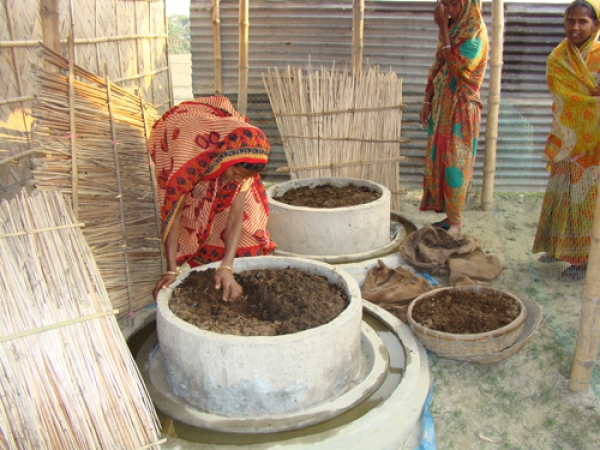Climate Change Adaptation and Disaster Risk Reduction in Bangladesh

Climate Change Adaptation and Disaster Risk Reduction in Bangladesh is a women-centered initiative that helps communities in Bangladesh adapt to climate change by addressing extreme weather conditions such as cyclones and flooding, as well as the consequence of increased salinity conditions in agriculture in Bangladesh. The initiative, which is implemented by ActionAid Bangladesh, brings together groups of women who lead vulnerability assessments of climate risks and then identify action plans. These plans are later implemented by the same groups of women brought together by the initiative.
Fast facts:
Improved cooking-stoves installed in 110 households, reducing carbon emissions by 40 per cent compared to traditional stoves;
10 dams built to preserve fresh water and prevent salinity;
A roadside plantation of multipurpose fruit trees created, generating additional income for households.
The problem
The poorest and most powerless people in Bangladesh, women in particular, are the most vulnerable to climate change. Parts of the country are subject to flooding, drought, cyclones and the encroachment of salinity into freshwater sources. Women in Bangladesh are often marginalized and unaware of their rights or how to participate in their communities; this leaves them even more exposed to the effects of climate change.
The solution
ActionAid Bangladesh empowers women in Bangladesh to adapt to climate change at the community level. Groups of women lead vulnerability assessments of climate risks and then identify action plans. These actions plans are then implemented by the same groups of women brought together by ActionAid Bangladesh. This community-based approach empowers women to express their needs and increase their resilience to climate change.
As a result, improved cooking-stoves were installed in 110 households, 10 temporary dams were built to preserve fresh water for irrigation and reduce salinity in the land, and a raised cluster village was created for landless families in flood-prone areas.
Spillover effect
Scalability is a key element of this initiative, which channeled resources to the local government to enhance its capacity.
The initiative facilitates dialogue between communities and the local government to ensure that the good practices piloted by the women-led groups are scaled up.
The activity uses a model that focuses on building partnerships between national research and civil society organizations.
These groups can then share lessons learned and good practices, which can then be replicated and disseminated, increasing impact. Because this approach is flexible it can be adapted to the needs of local communities.
Source: unfccc.int

Facebook comments